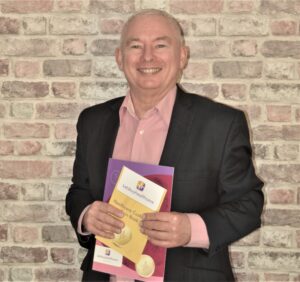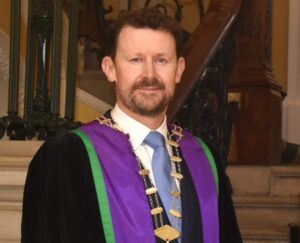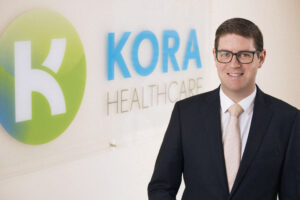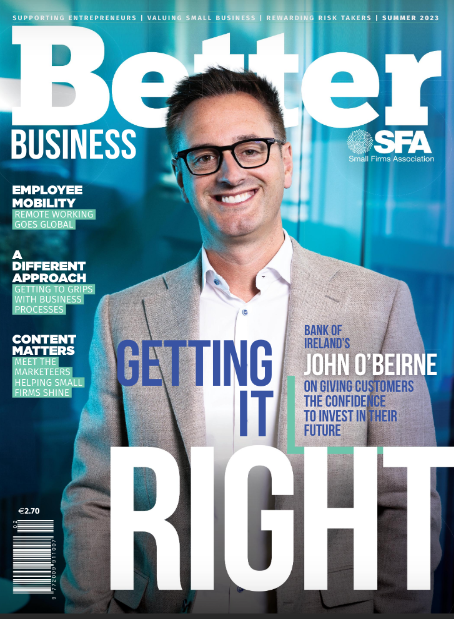Ireland boasts some of the most innovative healthcare companies in the world. Better Business meets three leaders in the healthcare space to talk about Covid, taking risks and their plans for expansion
David Allen

People who don’t have private health insurance or don’t qualify for medical card support now have an alternative option when it comes to funding their treatments. Set up by former director of finance at the National Treatment Purchase Fund David Allen and former director at Vhi John Looney, Letsbuyhealthcare offers members the chance to buy €50 healthcare vouchers, which can be redeemed for treatments by GPs and in hospitals and clinics. “That cohort of people who don’t qualify for a medical card or don’t have private insurance makes up about 20% of the population, so it’s a significant group of people,” said David Allen. Inspiration for the idea struck when David’s own mother needed to access medical treatment. “She didn’t have health insurance so I told her I would get a quote for the procedure that she needed. Getting that price was a nightmare; trying to get information about costs from the various hospitals was a complex, arduous process.” Today, members of Letsbuyhealthcare can simply login to their account, click on the hospital of their choosing and select a procedure. Information on costs is readily accessible. “We’ve also launched a new product called Healthcare Coins. It’s a new concept and is, we think, quite innovative.” A voucher-based product, members can buy Healthcare Coins that cost €50 each, effectively opting to self-pay for treatments and building up a healthcare fund in their name. “70% of people on public hospital surgical waiting lists are day cases. Those cases cost anything between €500 and €4000. So if you had a fund built up over time, chances are you could cover most of the treatment.” The Healthcare Coins will be of particular interest to small businesses, says David. “Small firms can use the Small Benefits Exemption for vouchers as gifts or awards for employees up to €500 a year and benefit from that tax break.” David and his partner John are also currently in talks with retailers around incorporating the health vouchers into a loyalty scheme. “That way, families could build up their own health care fund, potentially get contributions from their employer but also potentially get contributions from retailers.” Irish Life’s ILP Pension Trustees will oversee the operation of the funds, which will be operated as a health co-op. “It’s a way for people to prepare for the future costs of their healthcare. We’ve had great feedback already; people think it’s a fantastic idea. We’ve had enquiries from the USA, Poland, the UK, Portugal and Scotland. It’s such a simple idea but there’s nothing like it out there.”
Dr Robert Ryan

With offices in Dublin, Cork, Limerick, Galway, Waterford and Sligo, Medmark is one of only a handful of specialist occupational health providers in Ireland. Founded in 1987 by partners Dr Paul Gueret and Dr Patricia Holland who were later joined by Dr Robert Ryan, Dr Jacintha More O’Ferrall and Dr David Madden, Medmark offers advice on a wide range of issues such as health and work, disability, travel health, vaccinations, ergonomics, stress management and absence management.
Dr Robert Ryan joined Medmark in 1995. An initial interest in commerce segued into a career in medicine but thanks to his role in Medmark, he’s been able to combine the two interests over recent years. “About 10 years ago, I took on the role of Managing Partner in the practice and completed a Diploma in Business Development and a Master’s in Management in the IMI (Irish Management Institute). That dilemma of having to choose between commerce and medicine has been resolved and I’m thankful that I can do both.”
Businesses that engage with occupational health providers like Medmark are safeguarding the health and wellbeing of their staff. “Occupational health ensures that staff are fit to do the work that they’re being asked to do. They’re working in environments where the risks associated with that work have been assessed and quantified and measures have been put in place to ensure there’s no adverse health outcome for the employee.” Over the past two years, the teams at Medmark have been working tirelessly to support their clients in managing Covid. “Mental health issues, caused by the generalised anxiety associated with restrictions and the changing pattern of our daily life, are definitely emerging. Historically, people had all sorts of habits to promote their wellbeing, but those social activities have been taken away. Today, I’m seeing people whose mental health is frayed and that’s an issue that’s going to surface in the workplace.” Medmark provides a bespoke wellness offering to clients which can include a health and wellbeing digital platform, presentations to staff addressing particular issues or counselling services. “We’re seeing huge demand for that service at the moment, which I think is set to grow.”
Running the business side of the practice is something Robert takes great pride in. “I think most small businesses face similar challenges and that’s something I realised when I did the business course in the IMI. I’m lucky in that there’s an innate pleasure and satisfaction in being able to practice medicine, but also build and grow the business.”
Conor O’Daly

Earlier this year, Kora Healthcare was named ‘Exporter of the Year’ at the SFA National Small Business Awards. CEO Conor O’Daly attributes the win to the company’s export orientated outlook. “I think businesses in the healthcare sector need to export as the Irish market is so small. Approximately 4% of our turnover comes from Ireland so for us, exporting was a given. We perform well in the UK, continental Europe and Southeast Asia; we have a presence in about 29 countries at the moment and that figure is set to increase.”
Conor took over as CEO of Kora Healthcare in 2016. His involvement with the business stretches back to 2008 so he’s well placed to lead the team today. The company has chosen to focus on niche therapeutic areas, or what they call ‘supportive care’. “We try to follow the patient’s unmet needs in relation to long-term chronic illnesses. So where some of the large pharma companies are going after therapies like oncology and diabetes, we focus on the secondary conditions that arise from those diseases and impact on quality of life.”
Growth is steady says Conor and although it may not be as fast as he’d like, an ethos of ‘start small and think big’ is setting the family company on the right track. “It’s important to scale intelligently. When you’re faced with challenges like Brexit and Covid, taking stock and assessing where you stand is crucial.” Kora Healthcare’s response to Brexit was immediate; a UK division of the company, Kora Healthcare UK, was set up pretty much straight away. That quick thinking has been applauded the Enterprise Ireland and by other healthcare companies operating in Ireland as a quick-thinking, smart move. “We established an office in the University of York. Setting up a very real and tangible operational footprint has actually allowed us to grow a little closer to the UK but at the same time, we’re diversifying away from the UK by investing resources into European continents and North America.” Just a few weeks ago, the company set up a new entity and acquired a small business in Canada. “The UK remains an important market for us but making that leap into Europe and further afield is helping us to diversify and grow the business.”
If you’re not building a culture of innovation says Conor, you’re not building for the future. “That future includes scaling up; we’re about halfway through our 5-year strategic plan which is focused on international growth and the development of its product portfolio. We’re very much building the company at the moment and we’re feeling very confident for the future.”




